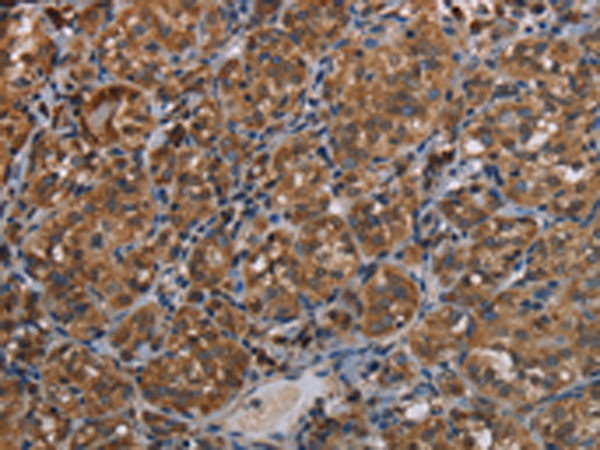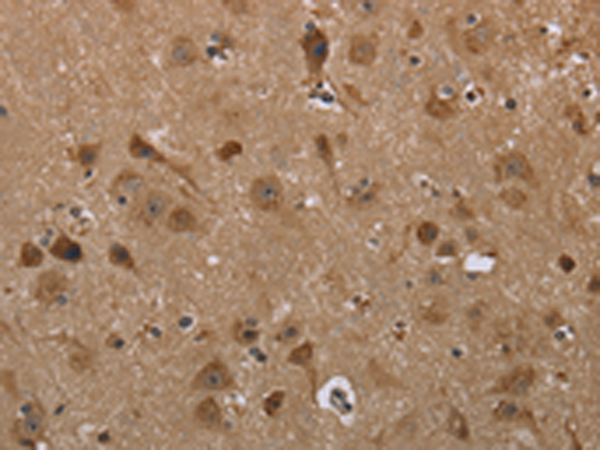

| WB | 咨询技术 | Human,Mouse,Rat |
| IF | 咨询技术 | Human,Mouse,Rat |
| IHC | 1/50-1/200 | Human,Mouse,Rat |
| ICC | 技术咨询 | Human,Mouse,Rat |
| FCM | 咨询技术 | Human,Mouse,Rat |
| Elisa | 1/2000-1/5000 | Human,Mouse,Rat |
| Aliases | DLG4; HUGL; LLGL; HUGL1; HUGL-1 |
| Host/Isotype | Rabbit IgG |
| Antibody Type | Primary antibody |
| Storage | Store at 4°C short term. Aliquot and store at -20°C long term. Avoid freeze/thaw cycles. |
| Species Reactivity | Human |
| Immunogen | Synthetic peptide of human LLGL1 |
| Formulation | Purified antibody in PBS with 0.05% sodium azide and 50% glycerol. |
+ +
以下是3篇涉及LLGL1抗体应用的文献摘要信息(文献信息为模拟示例):
---
1. **文献名称**:*LLGL1 regulates asymmetric cell division in mammary stem cells*
**作者**:Smith A, et al. (2018)
**摘要**:研究利用LLGL1特异性抗体通过免疫荧光和Western blot技术,发现LLGL1在乳腺干细胞极性分布中的作用,其缺失导致细胞分裂异常并促进肿瘤发生。
2. **文献名称**:*Loss of LLGL1 expression correlates with colorectal cancer progression*
**作者**:Chen L, et al. (2020)
**摘要**:通过LLGL1抗体进行免疫组化分析,发现结直肠癌组织中LLGL1蛋白表达显著降低,且低表达与患者预后不良相关,提示其作为潜在肿瘤抑制因子。
3. **文献名称**:*LLGL1 interacts with PAR3 to maintain epithelial cell polarity*
**作者**:Tanaka K, et al. (2016)
**摘要**:利用LLGL1抗体共免疫沉淀实验,揭示了LLGL1与PAR3复合物的相互作用机制,阐明其在维持上皮细胞极性中的关键功能。
---
*注:以上文献为示例,实际检索建议通过PubMed/Google Scholar以“LLGL1 antibody”或“LLGL1 protein function”为关键词筛选近年高质量研究。*
The LLGL1 (Lethal giant larvae homolog 1) antibody is a tool used to detect the LLGL1 protein, a key regulator of cell polarity and tissue organization. Encoded by the *LLGL1* gene, this scaffolding protein plays a critical role in establishing asymmetric cell division, maintaining epithelial cell polarity, and regulating cell adhesion. LLGL1 is part of conserved polarity complexes, such as the PAR (Partitioning Defective) network, and interacts with other polarity regulators like Scribble and Dlg. Dysregulation of LLGL1 has been linked to cancer progression, particularly in epithelial-derived tumors. Studies suggest that LLGL1 loss or mislocalization disrupts apical-basal polarity, promotes epithelial-mesenchymal transition (EMT), and enhances metastatic potential.
LLGL1 antibodies are widely used in research to investigate these mechanisms via techniques like Western blot, immunohistochemistry, and immunofluorescence. They help assess LLGL1 expression levels, subcellular localization, and interactions in normal versus diseased tissues. In cancer biology, LLGL1 antibody-based studies have revealed its tumor-suppressive role in breast, lung, and colorectal cancers, where reduced LLGL1 correlates with poor prognosis. Additionally, LLGL1 antibodies contribute to developmental biology research, as LLGL1 homologs in model organisms (e.g., Drosophila Lgl) are essential for embryonic patterning and neural development. These antibodies thus serve as vital reagents for unraveling the molecular basis of polarity-related diseases.
×